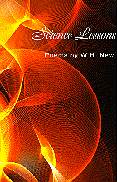


|
Science Lessons.
W. H. New.
Grades 11 and up / Ages 16 and up. *** /4
|

excerpt:
MechanicsW.H. New is an academic - a chair in the Canadian Studies department at UBC and an editor of the critical quarterly Canadian Literature - who has taught and lectured all over the world. He is also a fine writer whose work, in his first collection of poetry, Science Lessons, is accessible and sympathetic to almost any reader.It all depends what you mean by amateur:
nobody had formal training, that's for sure,
but it didn't matter when Cooper and Myshkin
and even Jack Ratigan on Saturday after tea
would gather by the John Deere
and give advice to the old man: Oil
and grease'er, Sparks, Always the carb, mostly
monosyllables, Try'er now, and after
an hour of blunt talk against change,
pink socks, city markets, good-
for-nothin'g-uvvinmint rules, they'd everything fixed,
and the tractor spit and spit and spit to life.
They wrenched the world together, these men,
loving the simplicity of machines.
The eighty poems in this collection follow the life of a central character, beginning when he is fourteen and moving with him into adulthood as he tries to match his individual needs to the collective workings of society. Marrying opposites is a recurrent theme throughout the poems, which use scientific terms to blend chaos with order, progress with tradition, subjectivity with objectivity, and practicality with aesthetics. In Radar, the central character tries to appear sane and coherent around the girl of his dreams. New perfectly captures this dilemma.
Ardently
inside his head, he's singing sonnets,
meadowgrass and moss rose; aloud
He only mutters Hi and switches colour.
New's use of language is deft; the poetry flows easily with a good variety of words that are modern and easily comprehensible to senior high level students. The sonnet form is also useful for teaching purposes. Science Lessons would be a welcome addition to any classroom, as well as both public and private library collections.
Highly recommended.
Deborah Mervold is a teacher/librarian in a grade 6 to 12 school, and a Grade 12 English teacher at Shellbrook Composite High School.

To comment on this title or this review, send mail to cm@umanitoba.ca.
Copyright © 1997 the Manitoba Library Association. Reproduction for personal use is permitted only if this copyright notice is maintained. Any other reproduction is prohibited without permission.
Published by
The Manitoba Library Association
ISSN 1201-9364
AUTHORS |
TITLES |
MEDIA REVIEWS |
BOOKSHELF
BACK ISSUES |
SEARCH |
HOME